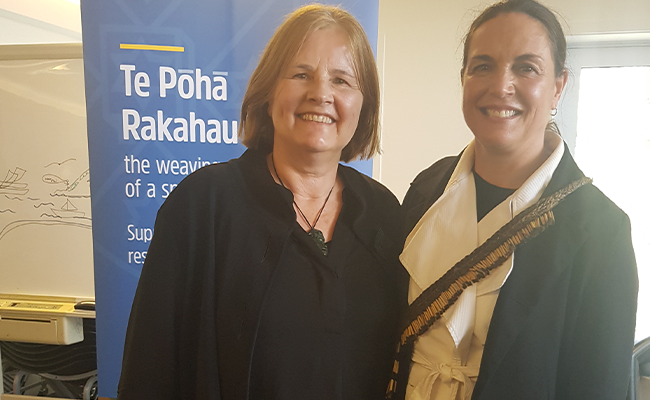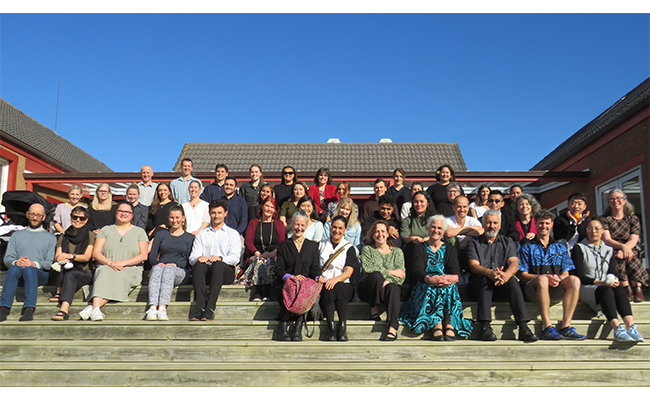
Associate Dean Māori from Otago's Wellington campus, Associate Professor Bridget Robson and School of Physiotherapy Associate Dean Māori, Katrina Pōtiki Bryant.
Partners in Māori research in physiotherapy gathered at Ōtākou Marae in early September to celebrate and showcase the journey of Te Pōhā Rakahau Korikori.
Te Pōhā Rakahau Korikori is the weaving and creating of a space for Māori research and researchers in physiotherapy to flourish.
The School of Physiotherapy's Associate Dean Māori, Katrina Pōtiki Bryant (Waitaha, Kāti Mamoe, Kāi Tahu), explains that the concept of Te Pōhā Rakahau Korikori is not a simply a physical space, but also a metaphorical idea of a connecting space.
“The word pōhā in the name holds significance to what we are creating. A traditional pōhā is a receptacle made of dried bull kelp or rimurapa, tōtara bark, and woven kete to hold kai such as manu tītī. A pōhā is protective, keeping its precious contents safe and secure; it is also robust and able to be transported,” Ms Bryant says.
“We are aiming to weave together different approaches to research and matauraka , creating a safe space between community, the School of Physiotherapy and our Māori phyisotherapists in that community to allow Māori research to flourish.”
Dean of the School of Phyisotherapy Professor Leigh Hale says that this space is not a static state, and does not just sit with the University.
“It is a celebration of our dynamic and brave research space, and movement in all its dimensions,” Professor Hale says.
Attendees at Ōtākou Marae included community research partners, staff and student researchers from the School of Physiotheraphy, representatives from the Health Research Council, and the Accident Compensation Corporation.
The event opened with kōrero between Associate Dean Māori from Otago's Wellington campus, Associate Professor Bridget Robson (Ngāti Raukawa), and Ms Bryant on the journey of research.
Associate Professor Robson is the Director of Te Rōpū Rangahau Hauora a Eru Pōmare. Her research interests are in the areas of social and economic determinants of health, inequitable treatment in the health system, the impact of racism on health, and the development of kaupapa Māori epidemiology.

Te Pōhā Rakahau Korikori is the weaving and creating of a space for Māori research and researchers in physiotherapy to flourish.
The pair covered many topics, including that they both bring their whakapapa and whakawhanaungatanga into their research, weaving everyone who has been involved along the way into the journey.
They are both very aware of their responsibility for the research they are entrusted with. There is a focus in Associate Professor Robson's research on the systems that continue to cause inequity, and then looking beyond this to how we address this to make positive change.
An illustration of community-led, solutions-based research kaupapa followed this kōrero. Kaumātua from Ōtākou Marae and Ms Bryant showcased Taurite Tū, a programme they have developed that incorporates Māori movement with physiotherapy falls prevention research. This community-led, research-based initiative has had a positive impact. In partnership with ACC, HRC and Ageing Well, it has been picked up in communities across Aotearoa and adpated by them, which has also increased the research capacity.
An important aspect of Te Pōhā Rakahau Korikori is capacity building for Māori-led research. Maōri research tauira (students) presented on their research. Recent graduate Sydney Hynes travelled from Petone for the event. She has just begun working as a physiotherapist in the older persons' unit at Hutt Hospital: “Growing up Māori it feels natural to me that my number one job is to look after my kaumātua.”
Ms Hynes will also be an Assistant Research Fellow with the School of Physiotherapy, on a project working with Māori and Pacific peoples with lived experience of Parkinson's disease.
She has done two Summer Studentships with the School. Through this research she has realised how much of her Māori upbringing she was incorporating into practice and how important it is to continue to embrace it. For her, Te Pōhā Rakahau Korikori is about creating a safe space for everyone involved.
“It's making sure I feel safe and knowledgable in talking about my research. Being able to voice my perspective, and that my mana is intact, the mana of the people I have talked to is intact.
“The taking of information can be quite jarring from a Māori perspective – we are giving you a lot of our mana to tell our story and if you're not saying it the right way, it makes us less inclined to reach out for any other research. This is going to be an interesting journey and I am so pleased to get to be part of it,” Ms Hynes says.
- Kōrero by Antonia Wallace
